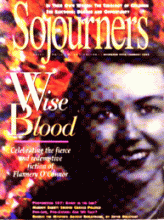James Carse is, not surprisingly, a repeated winner of New York University's Distinguished Teach-ing Award. He has a contemplative's eye with which to see and a poet's skill to describe what he has seen.
The subtitle to his recent book Breakfast at the Victory is "the mysticism of ordinary experience." The author states his premise in a chapter titled "The Way the Soul Sees": Carse writes, "It is one thing to see something remarkable appearing inexplicably in the world, it is quite another to see the world itself as remarkable and all of existence as inexplicable."
The reader is given an ample feast of truths from mystical writings. Carse, a professor of the history and literature of religion, is well-versed in classical Christian spirituality as well as Sufi stories, the writings of Rumi, Lao Tsu, the Upanishads, Islam, and the works of philosophers and novelists. Some Christian readers may feel he relies too heavily on non-Christian tradition, but I found the rich variety to be rewarding.
Each chapter contains a particular story, with several themes woven through it. As you proceed in the reading there are also connections back to previous stories, incidents, and characters. These connections are helpful without detracting from the primary focus of each chapter.
The major theme or premise-that the mystical shines through the mundane-is conveyed through the recounting of very ordinary experiences. The book is really a collection of stories from Carse's life. I loved the variety: the unique movements and graceful "dance" of a one-legged short order cook who owned the Victory Luncheonette, the silence of Carse's mother after he delivered a keynote address at his alma mater, the loneliness following his wife's death after a long and terrible struggle with cancer.
Read the Full Article
